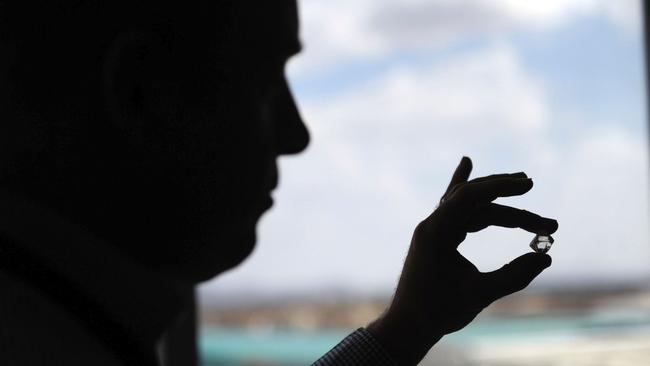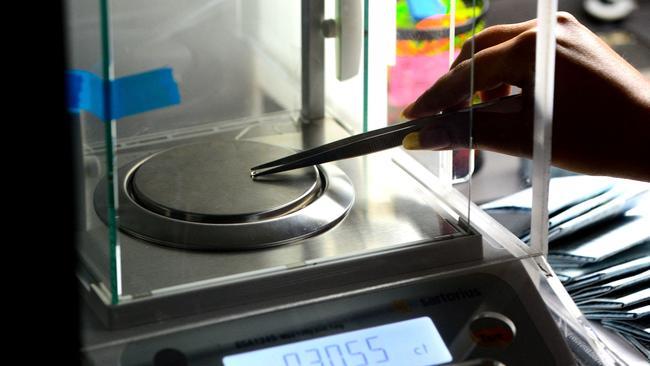De Beers’ diamonds no longer Anglo American’s crown jewels
Anglo American’s problem lies in competition from laboratory gems which sell at a fraction of the price but have become so good that a machine is needed to tell them apart.

Australia has no embassy in Botswana but covers relations from the High Commission in Pretoria, South Africa.
Yet in April, Australia’s BHP came close to a controlling stake in the Botswana economy when it offered just over $72bn for Anglo American which, in turn, owns the most famous name in diamonds, De Beers. And most of the De Beers gems come from Botswana, which ranks first in the world by value in diamonds.
Anglo made news in Queensland at the end of June when a fire broke out at one of its coal mines at Moranbah, 1030km northwest of Brisbane. The mine employs 1400 workers and the company says it is unlikely to reopen before the first quarter of 2025.
For almost a century since it was founded in Johannesburg in 1917, Anglo American was associated with the Oppenheimer family, one of the richest in Africa. But by 2012 they had disposed of their last shares and the company is now listed on the London Stock Exchange. The South African government and Blackrock are among its owners, but none with enough stock to control the board.
Ironically, the draw for BHP was not in Botswana’s diamonds – prices have dropped with the advance of factory made stones – or the platinum fields in South Africa which has 70 per cent of the world’s known deposits. It was Anglo’s copper mines in Chile that BHP wanted, as global demand and prices are soaring for the metal used to transmit electricity.
Copper is touching $US10,000 per tonne and has almost doubled in price over the past four years. Chile is the world’s top exporter with Australia at number nine.
BHP had said that if successful it would sell De Beers and the platinum holdings. Anglo had made no such move until it rejected the takeover upon which the CEO, Duncan Wanblad, announced that his board would follow the BHP plan, withdrawing from diamonds and platinum and selling its Australian coal fields.
At the University of Witwatesrand in Johannesburg, Mbuso Moyo wrote his PhD around platinum and says the world needs to watch closely as buyers line up for the Anglo stock.
“This is a strategic metal, most of which lies in South Africa. Russia has a small amount but their sales are under sanctions. But what if Russia, China or some investor hostile to the West bought the Anglo platinum mines?”
He said the company appeared to have been in trouble for some time, given that “the price of platinum has halved to a little over $US900 per ounce with no sign of a bounce back to above $US2000 as used to be the case.”

Moyo said this, and the drop in diamond sales, had “left Anglo American vulnerable long before BHP tried to buy them out”.
In February, Anglo wrote down the value of De Beers by $US1.6bn. The problem lies in competition from laboratory gems which sell at a fraction of the price but have become so good that a machine is needed to tell them apart.
Last year, around 40 per cent of engagement rings in the US used lab gems. Spending has not gone down but buyers get a bigger stone for the same price.
This has been bad news for Botswana which, since independence from Britain in 1966, is the only African country not to have experienced a coup or a period of unconstitutional rule. The Botswana Democratic Party (BDP) has won each of the five-yearly elections, albeit by a falling margin. The founding president, Sir Seretse Khama, had married a white Englishwoman, Ruth Williams, who won the nation’s acceptance as first lady. Their son, Ian Khama, now 71, was head of the army and, from 2008, president for the maximum of two terms allowed under the law.
On retirement, his successor Mokgweetsi Masisi accused him of embezzlement but with no evidence of the missing money. Khama stays in voluntary exile between South Africa and Britain, fearing arrest at home.
Masisi, 62, is running for his second and final term at an election in October and has dismissed rumours of ill-health. His brother died of kidney failure in 2013.
Standing against him is the Harvard lawyer Duma Boko, who at 54 believes he has a chance to oust the BDP. He has united several smaller parties under the Umbrella for Democratic Change or UDC, and Boko has held massive rallies around the country.
If successful, one of his key policies will be to “bring home De Beers”, by putting together a group of investors including the Botswana government and buying the company from Anglo.
“We are the world’s major source of diamonds. So the most famous diamond house should be headquartered in our capital city, Gaborone.”
Boko said he saw no problem with both Anglo and BHP being among the minority shareholders, “but we would want a board that takes decisions for the good of the industry and of Botswana”.
He said there was a problem in Africa with companies where the state is a partner, “because the firm becomes a sheltered workshop for the families of ministers who think they should get the top jobs”.
Boko pledged to establish a monitoring team, “well removed from government to ensure transparency at every level, and the company will be run along the best lines of global practice”.
He called on Commonwealth nations to send observers to the October ballot. “Our fellow members who have the funds and capacity to do this must ensure that the vote is free and fair,” he said. “I see Australia, Canada, India, South Africa, Kenya and the UK as key partners in this because they have experience in monitoring elections. Not just on the day but making sure all candidates get equal time on state media and that the police, army and civil service do nothing to influence the choice of the people.”
Geoff Hill is an Australian author and journalist based in Johannesburg.



To join the conversation, please log in. Don't have an account? Register
Join the conversation, you are commenting as Logout